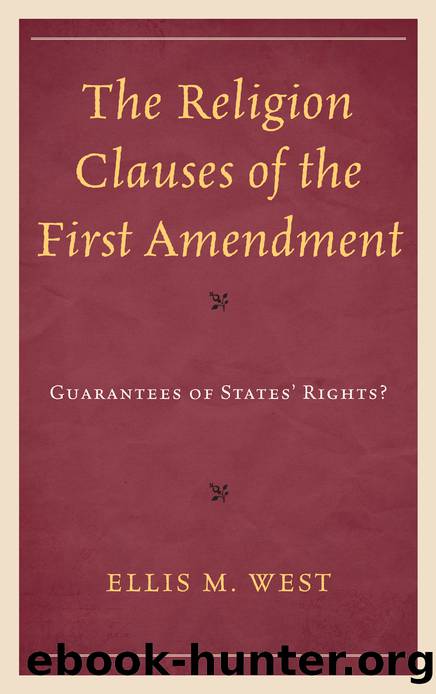The Religion Clauses of the First Amendment by West Ellis M.;

Author:West, Ellis M.;
Language: eng
Format: epub
Tags: undefined
Publisher: Lexington Books
Published: 2012-08-15T00:00:00+00:00
VI. The Final Wording of the Establishment Clause
The fourth, and final, change in wordingâand one that might have been intended to give the amendment federalist contentâwas the one made by the conference committee, i.e., the change from no law âestablishing religionâ (proposed by House) or âestablishing articles of faith or a mode of worshipâ (proposed by Senate) to no law ârespecting an establishment of religion.â[99] Although this final wording on its face is broad enough to make it consistent with a federalist interpretation of the religion clauses,[100] by itself that is insufficient to warrant the conclusion that the establishment clause âdoes not express a value of ânonestablishmentââ[101] or that its sole purpose was to prevent Congress from overturning state laws on religion.[102]
Instead, given its wording, the clause could have been intended to prohibit the federal government from passing laws that Americans would have associated with traditional establishments of religion. In other words, the word ârespectingâ may have been added to the proposed amendment in order to prohibit not just a law establishing a religion but any and all laws that were characteristic of such an establishment, including laws that discriminate in any way on the basis of religious belief, practice, or membership. According to one group of scholars, â. . . many [may have] feared that while Congress might not have the power to officially proclaim an established religion in one stroke of the legislative pen, the same undesired end might be reached by smaller steps by the quiet enactment of laws which in themselves would not amount to an establishment, but when added together might have the cumulative effect of totaling a de facto establishment.â[103] Moreover, the reason for such a prohibition would have been normativeâbecause such laws violate personsâ natural rights or threaten the unity and stability of the nation.[104] In 1785 a perfect example of this fear came from the pen of John Carroll, a Catholic priest who later became the first Catholic bishop in the United States: â[Catholics] have all smarted heretofore under the lash of an established church and shall therefore to [sicâbe?]on our guard against every approach to it.â[105]
So which of these two readingsâto protect state laws on religion or to protect religious liberty from anything like a national religious establishmentâis the correct interpretation of the establishment clause?
Unfortunately we simply do not know for sure. There is nothing in the record of the First Congress or elsewhere that explains why the House/Senate committee worded the establishment clause the way it did. Specifically, there is no evidence showing that the clause was sought to protect state laws on religion, that persons who might have wanted to protect such laws were responsible for the final wording of the clause, or that anyone at the time of its drafting or ratification understood the establishment clause in this way.[106] Any explanation of the change, therefore, has to be based on circumstantial evidence.[107] This does not mean, however, that the circumstantial evidence supporting the competing interpretations of the establishment clause is equally strong and compelling.
Download
This site does not store any files on its server. We only index and link to content provided by other sites. Please contact the content providers to delete copyright contents if any and email us, we'll remove relevant links or contents immediately.
Tasting Mother-In-Law (Mother In Law Son In Law Erotic & Taboo Short Story) (Naughty In Law Book 3) by Rush Penny(325)
Carl Schmitt Between Technological Rationality and Theology by Hugo E. Herrera;(304)
The Love Conspiracy: An Age-Gap Lesbian Romance by Arias J.J(286)
Tor and the Dark Net · Remain Anonymous Online and Evade NSA Spying (Tor, Dark Net, Anonymous Online, NSA Spying) by Smith James(274)
EARLY GRAVE (Jake Lassiter Legal Thrillers Book 12) by Paul Levine(271)
The Rise of Critical Islam by Youcef L. Soufi(262)
HABEAS PORPOISE (Solomon vs. Lord) by Levine Paul(259)
If We Burn by Vincent Bevins(255)
Democratic Quality in Southern Europe by Tiago Fernandes(248)
Natural Rights on the Threshold of the Scottish Enlightenment by Unknown(241)
Toward revealing the controversy of bacterial biosynthesis versus bactericidal properties of silver nanoparticles (AgNPs): bacteria and other microorganisms do not per se viably synthesize AgNPs by Fatthy Mohamed Morsy(223)
Light-evoked depolarizations in the retina of <Emphasis Type="Italic">Strombus <Emphasis>: Role of calcium and other divalent cations by Unknown(218)
Women before the court by Lindsay R. Moore(195)
When Hope and History Rhyme by Douglas Burgess(179)
A New Daddy by orphan_account(178)
Witches, Wife Beaters, and Whores by Elaine Forman Crane(175)
To Raise and Discipline an Army by Joshua Kastenberg(172)
Critique of the Legal Order by Richard Quinney Randall G. Shelden(172)
The Crimes of Womanhood by A. Cheree Carlson(172)
